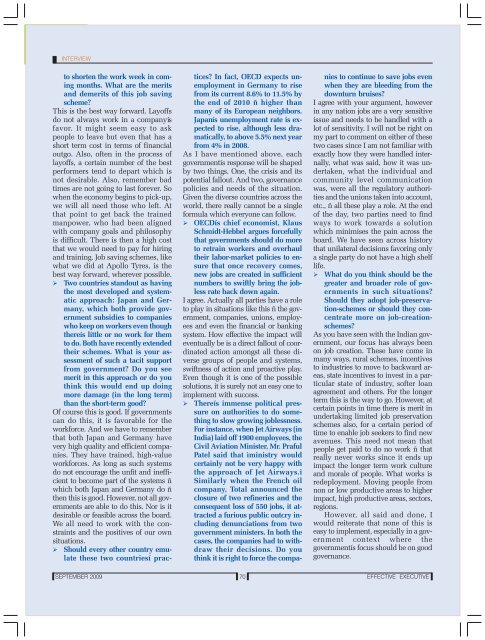Social Cause Marketing - The Regis Group Inc
Social Cause Marketing - The Regis Group Inc
Social Cause Marketing - The Regis Group Inc
Create successful ePaper yourself
Turn your PDF publications into a flip-book with our unique Google optimized e-Paper software.
INTERVIEW<br />
to shorten the work week in coming<br />
months. What are the merits<br />
and demerits of this job saving<br />
scheme?<br />
This is the best way forward. Layoffs<br />
do not always work in a companyís<br />
favor. It might seem easy to ask<br />
people to leave but even that has a<br />
short term cost in terms of financial<br />
outgo. Also, often in the process of<br />
layoffs, a certain number of the best<br />
performers tend to depart which is<br />
not desirable. Also, remember bad<br />
times are not going to last forever. So<br />
when the economy begins to pick-up,<br />
we will all need those who left. At<br />
that point to get back the trained<br />
manpower, who had been aligned<br />
with company goals and philosophy<br />
is difficult. <strong>The</strong>re is then a high cost<br />
that we would need to pay for hiring<br />
and training. Job saving schemes, like<br />
what we did at Apollo Tyres, is the<br />
best way forward, wherever possible.<br />
Two countries standout as having<br />
the most developed and systematic<br />
approach: Japan and Germany,<br />
which both provide government<br />
subsidies to companies<br />
who keep on workers even though<br />
thereís little or no work for them<br />
to do. Both have recently extended<br />
their schemes. What is your assessment<br />
of such a tacit support<br />
from government? Do you see<br />
merit in this approach or do you<br />
think this would end up doing<br />
more damage (in the long term)<br />
than the short-term good?<br />
Of course this is good. If governments<br />
can do this, it is favorable for the<br />
workforce. And we have to remember<br />
that both Japan and Germany have<br />
very high quality and efficient companies.<br />
<strong>The</strong>y have trained, high-value<br />
workforces. As long as such systems<br />
do not encourage the unfit and inefficient<br />
to become part of the systems ñ<br />
which both Japan and Germany do ñ<br />
then this is good. However, not all governments<br />
are able to do this. Nor is it<br />
desirable or feasible across the board.<br />
We all need to work with the constraints<br />
and the positives of our own<br />
situations.<br />
Should every other country emulate<br />
these two countriesí practices?<br />
In fact, OECD expects unemployment<br />
in Germany to rise<br />
from its current 8.6% to 11.5% by<br />
the end of 2010 ñ higher than<br />
many of its European neighbors.<br />
Japanís unemployment rate is expected<br />
to rise, although less dramatically,<br />
to above 5.5% next year<br />
from 4% in 2008.<br />
As I have mentioned above, each<br />
governmentís response will be shaped<br />
by two things. One, the crisis and its<br />
potential fallout. And two, governance<br />
policies and needs of the situation.<br />
Given the diverse countries across the<br />
world, there really cannot be a single<br />
formula which everyone can follow.<br />
OECDís chief economist, Klaus<br />
Schmidt-Hebbel argues forcefully<br />
that governments should do more<br />
to retrain workers and overhaul<br />
their labor-market policies to ensure<br />
that once recovery comes,<br />
new jobs are created in sufficient<br />
numbers to swiftly bring the jobless<br />
rate back down again.<br />
I agree. Actually all parties have a role<br />
to play in situations like this ñ the government,<br />
companies, unions, employees<br />
and even the financial or banking<br />
system. How effective the impact will<br />
eventually be is a direct fallout of coordinated<br />
action amongst all these diverse<br />
groups of people and systems,<br />
swiftness of action and proactive play.<br />
Even though it is one of the possible<br />
solutions, it is surely not an easy one to<br />
implement with success.<br />
<strong>The</strong>reís immense political pressure<br />
on authorities to do something<br />
to slow growing joblessness.<br />
For instance, when Jet Airways (in<br />
India) laid off 1900 employees, the<br />
Civil Aviation Minister, Mr. Praful<br />
Patel said that ìministry would<br />
certainly not be very happy with<br />
the approach of Jet Airways.î<br />
Similarly when the French oil<br />
company, Total announced the<br />
closure of two refineries and the<br />
consequent loss of 550 jobs, it attracted<br />
a furious public outcry including<br />
denunciations from two<br />
government ministers. In both the<br />
cases, the companies had to withdraw<br />
their decisions. Do you<br />
think it is right to force the companies<br />
to continue to save jobs even<br />
when they are bleeding from the<br />
downturn bruises?<br />
I agree with your argument, however<br />
in any nation jobs are a very sensitive<br />
issue and needs to be handled with a<br />
lot of sensitivity. I will not be right on<br />
my part to comment on either of these<br />
two cases since I am not familiar with<br />
exactly how they were handled internally,<br />
what was said, how it was undertaken,<br />
what the individual and<br />
community level communication<br />
was, were all the regulatory authorities<br />
and the unions taken into account,<br />
etc., ñ all these play a role. At the end<br />
of the day, two parties need to find<br />
ways to work towards a solution<br />
which minimises the pain across the<br />
board. We have seen across history<br />
that unilateral decisions favoring only<br />
a single party do not have a high shelf<br />
life.<br />
What do you think should be the<br />
greater and broader role of governments<br />
in such situations?<br />
Should they adopt job-preservation-schemes<br />
or should they concentrate<br />
more on job-creationschemes?<br />
As you have seen with the Indian government,<br />
our focus has always been<br />
on job creation. <strong>The</strong>se have come in<br />
many ways, rural schemes, incentives<br />
to industries to move to backward areas,<br />
state incentives to invest in a particular<br />
state of industry, softer loan<br />
agreement and others. For the longer<br />
term this is the way to go. However, at<br />
certain points in time there is merit in<br />
undertaking limited job preservation<br />
schemes also, for a certain period of<br />
time to enable job seekers to find new<br />
avenues. This need not mean that<br />
people get paid to do no work ñ that<br />
really never works since it ends up<br />
impact the longer term work culture<br />
and morale of people. What works is<br />
redeployment. Moving people from<br />
non or low productive areas to higher<br />
impact, high productive areas, sectors,<br />
regions.<br />
However, all said and done, I<br />
would reiterate that none of this is<br />
easy to implement, especially in a government<br />
context where the<br />
governmentís focus should be on good<br />
governance.<br />
SEPTEMBER 2009<br />
70<br />
EFFECTIVE EXECUTIVE








